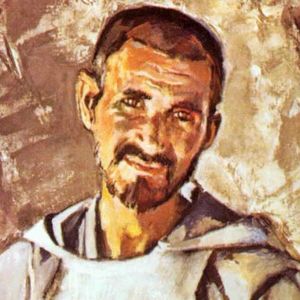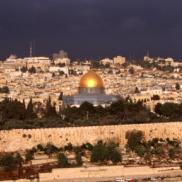


Artikel über Leben, Liturgie, Theologie, Gebräuche und Ereignisse der verschiedenen Kirchen und christlichen Gemeinschaften in Israel (Katholiken, Orthodoxe, Protestanten und messianische Juden).
 On the one hand, there is the Christian message of unconditional love and its emphasis on self-sacrifice at the hands of those who hate you unjustly: "No one can have greater love than to lay down his life for his friends." On the other hand, there is the logic of war: you want to liquidate those who hate you to the point of murdering your nation by all possible means, preferably the most horrific ones. What I identify as problematic is the conflation of these two logics - a confusion that I have a hard time not considering to be deliberate.
On the one hand, there is the Christian message of unconditional love and its emphasis on self-sacrifice at the hands of those who hate you unjustly: "No one can have greater love than to lay down his life for his friends." On the other hand, there is the logic of war: you want to liquidate those who hate you to the point of murdering your nation by all possible means, preferably the most horrific ones. What I identify as problematic is the conflation of these two logics - a confusion that I have a hard time not considering to be deliberate.
 While most Evangelical Protestants are generally friendly to the Jewish people and the State of Israel, there is a small band of Evangelical pastors and professors who want to line up all Evangelicals unilaterally on the Palestinian side. The most egregious example may be Anglican vicar Stephen Sizer, whose has chummed up with the likes of Naturei Karta and Iranian President Ahmadinejad. But Gary Burge probably wields the greater influence.
While most Evangelical Protestants are generally friendly to the Jewish people and the State of Israel, there is a small band of Evangelical pastors and professors who want to line up all Evangelicals unilaterally on the Palestinian side. The most egregious example may be Anglican vicar Stephen Sizer, whose has chummed up with the likes of Naturei Karta and Iranian President Ahmadinejad. But Gary Burge probably wields the greater influence.
 In the plan of God’s rule over history, Israel has a great role to play in preparing the nations for the return of the Messiah in glory. In the twentieth century began the great epochal change preparing mankind for the conclusive event of history: the final coming of the Kingdom of God, for which all Christians pray every day, saying: Thy Kingdom come!
In the plan of God’s rule over history, Israel has a great role to play in preparing the nations for the return of the Messiah in glory. In the twentieth century began the great epochal change preparing mankind for the conclusive event of history: the final coming of the Kingdom of God, for which all Christians pray every day, saying: Thy Kingdom come!
 Ende 2009 tat sich eine kleine Gruppe christlicher palästinensischer Geistlicher und Laien zusammen und ersann ein Dokument mit dem Titel „Kairos Palästina“. Zwei Jahre später, hat der harte Kern der ursprünglichen Autoren in Bethlehem mit Unterstützern aus dem Ausland eine Konferenz zum Jahrestag abgehalten. Diesmal machten sie sich zum Tribunal, vor dem alle Kirchen der Welt angeklagt wurden, sie zeigten nicht genug Begeisterung für das damalige Dokument.
Ende 2009 tat sich eine kleine Gruppe christlicher palästinensischer Geistlicher und Laien zusammen und ersann ein Dokument mit dem Titel „Kairos Palästina“. Zwei Jahre später, hat der harte Kern der ursprünglichen Autoren in Bethlehem mit Unterstützern aus dem Ausland eine Konferenz zum Jahrestag abgehalten. Diesmal machten sie sich zum Tribunal, vor dem alle Kirchen der Welt angeklagt wurden, sie zeigten nicht genug Begeisterung für das damalige Dokument.
Weiterlesen: „Kairos Palästina“: Vom Geflunker zum Größenwahn
 Seit mehr als zwei Jahrzehnten wird die christliche Welt von den Schriften selbst ernannter „palästinensischer christlicher Theologen“ durcheinander gebracht. Da ihre hellsten Leuchten protestantische Pastoren sind, sind sie kleine Lichter unter den überwiegend orthodoxen und katholischen Gläubigen des Heiligen Landes. Doch in modernistisch-protestantischen Kreisen des Auslands sind sie eigentümlich beliebt; Kirchenbürokraten hegen sie besonders.
Seit mehr als zwei Jahrzehnten wird die christliche Welt von den Schriften selbst ernannter „palästinensischer christlicher Theologen“ durcheinander gebracht. Da ihre hellsten Leuchten protestantische Pastoren sind, sind sie kleine Lichter unter den überwiegend orthodoxen und katholischen Gläubigen des Heiligen Landes. Doch in modernistisch-protestantischen Kreisen des Auslands sind sie eigentümlich beliebt; Kirchenbürokraten hegen sie besonders.
Weiterlesen: „Palästinensischer Theologe“ wirft „palästinensische Theologie“ in den Müll
 A “bird’s eye view” of the Latin Catholic Church in the Holy Land, including the Latin Patriarchate of Jerusalem and the Franciscan Custody of the Holy Land.
A “bird’s eye view” of the Latin Catholic Church in the Holy Land, including the Latin Patriarchate of Jerusalem and the Franciscan Custody of the Holy Land.
 The Orthodox churches count among them some of the oldest churches in Christianity. Because they almost all originated in the east they are usually known as the "eastern" churches.
The Orthodox churches count among them some of the oldest churches in Christianity. Because they almost all originated in the east they are usually known as the "eastern" churches.
 The Hidden Roots of the Crisis of the Church in the Holy Land: In the troubled Holy Land, divided and torn by conflict, local Church leaders and Christians of all colors often claim to speak a tireless message of justice, reconciliation and peace. If only more people would listen to this message - so they claim - it would surely dramatically improve the prospects for peace between the conflicting parties in the region. But is this true?
The Hidden Roots of the Crisis of the Church in the Holy Land: In the troubled Holy Land, divided and torn by conflict, local Church leaders and Christians of all colors often claim to speak a tireless message of justice, reconciliation and peace. If only more people would listen to this message - so they claim - it would surely dramatically improve the prospects for peace between the conflicting parties in the region. But is this true?
 There has been much excellent academic study of the history of Christianity in the land of its birth. It could fill a whole library. In recent years, however, all that fine work has been eclipsed by the myth, created by the so-called "Palestinian narrative," of Palestinian Christianity.
There has been much excellent academic study of the history of Christianity in the land of its birth. It could fill a whole library. In recent years, however, all that fine work has been eclipsed by the myth, created by the so-called "Palestinian narrative," of Palestinian Christianity.
 Catholics for Israel are highly aware of the precarious and difficult situation you find yourselves in. We are not against you by calling ourselves Catholics for Israel. It is precisely the concern for the situation you are in and the complexity of your situation that is motivating us to address and speak out those things that today most Catholics are afraid to even think about.
Catholics for Israel are highly aware of the precarious and difficult situation you find yourselves in. We are not against you by calling ourselves Catholics for Israel. It is precisely the concern for the situation you are in and the complexity of your situation that is motivating us to address and speak out those things that today most Catholics are afraid to even think about.
 Das selbst so benannte “Kairos Palestina”-Dokument wurde am 11. Dezember 2009 der Öffentlichkeit in Bethlehem von einem Gremium, dem der ehemalige lateinische Patriarch Michel Sabbah vorstand, vorgestellt. Das Dokument soll die Kirchen weltweit zur Unterstützung eines Plans mobilisieren, der Boykotts, Enteignungen und die Delegitimierung des Staates Israels vorsieht.
Das selbst so benannte “Kairos Palestina”-Dokument wurde am 11. Dezember 2009 der Öffentlichkeit in Bethlehem von einem Gremium, dem der ehemalige lateinische Patriarch Michel Sabbah vorstand, vorgestellt. Das Dokument soll die Kirchen weltweit zur Unterstützung eines Plans mobilisieren, der Boykotts, Enteignungen und die Delegitimierung des Staates Israels vorsieht.
Weiterlesen: Das palästinensische "Kairos" Dokument - eine Analyse